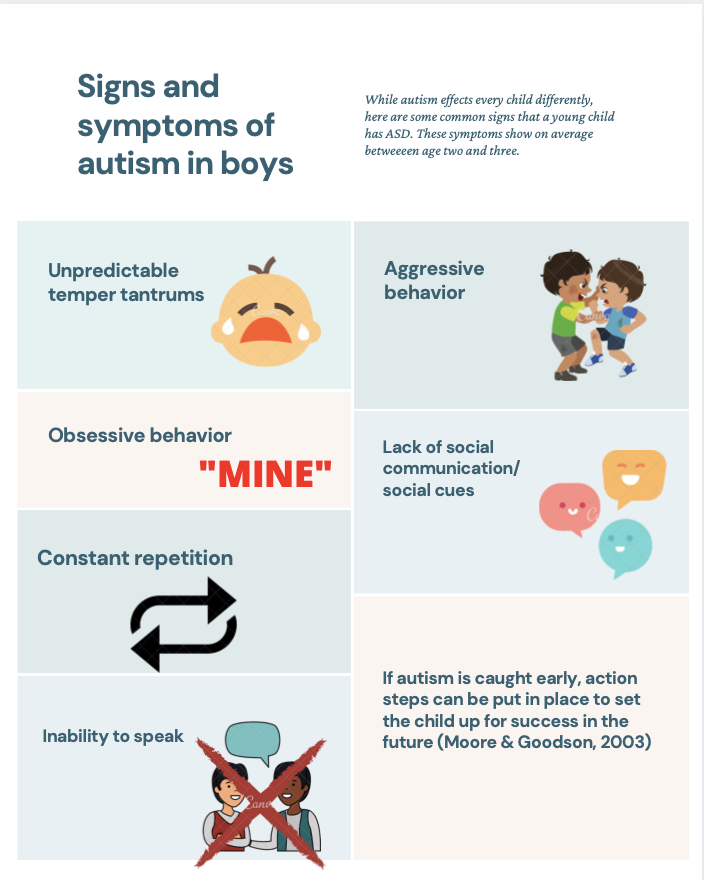Key Signs and Symptoms to Recognize in Individuals With Behavioral Autism
When you experience somebody with behavioral autism, recognizing essential symptoms and signs is necessary. You could see challenges in social interactions and communication, in addition to a solid need for regimens. In addition, sensory level of sensitivities can bring about frustrating experiences. Recognizing these attributes can improve your assistance and interventions, but there's even more to discover regarding exactly how these behaviors manifest in everyday scenarios. Let's explore what these signs truly look like.
Obstacles in Social Interactions
When you communicate with someone on the autism range, you might discover they battle with social signs and interaction. These difficulties can make social communications feel frustrating for them.
Additionally, you might find that they choose routines and acquainted setups, which can restrict their readiness to participate in new social circumstances. When they do involve, they could speak about their rate of interests in excellent detail without observing if you're interested. This can bring about one-sided conversations that leave you feeling separated. Recognizing these obstacles can help you approach communications with empathy and perseverance, fostering a more comfortable setting for both of you.
Difficulty With Verbal and Non-Verbal Communication

Non-verbal interaction can be a lot more tough. You could see a lack of eye contact or restricted use of motions, which can make communications feel unpleasant. Faces might not constantly straighten with the conversation, resulting in complication regarding their sensations. Acknowledging these signs is necessary, as it assists you better support and involve with people on the autism range. By comprehending their interaction difficulties, you can promote much more purposeful connections and supply a more supportive atmosphere.
Repetitive Habits and Regimens
Interaction challenges usually accompany other indicators of autism, such as recurring behaviors and a solid preference for routines. You may observe that people with autism frequently participate in specific, repeated actions, like hand-flapping, rocking, or repeating phrases. These habits can supply convenience and a feeling of control in an usually overwhelming world.
Routines are equally vital; numerous individuals prosper when they comply with an organized routine. You might locate that changes to these routines can lead to considerable distress. For instance, if they have an everyday ritual of eating morning meal at a details time or following a certain path to college, any disruption can create anxiousness.
Acknowledging these patterns assists you understand their behavior and give assistance. By suiting their requirement for regular and enabling repeated actions, you can produce a much more comfy atmosphere that alleviates their obstacles.
Sensory Level Of Sensitivities

Typical Sensory Triggers
Sensory level of sensitivities can substantially influence day-to-day life for individuals with autism, as particular stimuli usually set off frustrating reactions. Typical sensory triggers consist of loud noises, brilliant lights, and solid smells. You may see that abrupt noises, like alarm systems or sirens, create stress and anxiety or distress. In a similar way, fluorescent lighting in stores can really feel harsh and unpleasant. Textures can also play a substantial duty; harsh fabrics or particular food appearances may be intolerable for you. Furthermore, crowded locations can bewilder your detects, making it tough to concentrate or relax. Comprehending these triggers can assist you manage your atmosphere much better. By knowing what influences you, you can take actions to decrease pain and boost your day-to-day experiences.
Behavior Actions Clarified
Understanding your behavioral responses to sensory sensitivities is important, as they often expose exactly how you engage with the globe. You may additionally locate on your own looking for details sensory experiences, like deep stress or peaceful atmospheres, to assist ground on your own. Recognizing these patterns helps you comprehend your needs far better and can direct just how you interact them to others.
Coping Strategies Introduction
Acknowledging your sensory sensitivities is just the primary step; now it's time to check out coping strategies that can assist you manage those experiences successfully. Beginning by producing a sensory toolkit customized to your needs. This could consist of noise-canceling headphones, fidget toys, or relaxing aromas. Establishing a structured routine can likewise supply predictability, reducing anxiety around sensory overload. Take breaks in a silent room to collect yourself when you really feel overloaded. Exercising mindfulness techniques like deep breathing can aid ground you in the minute. Furthermore, interact your demands with those around you; having encouraging loved ones can make a massive distinction. Bear in mind, locating what functions finest for you may take time, so be open and patient to trying new approaches.
Restricted Interests and Emphasis
While several individuals develop a wide variety of rate of interests, those with autism typically demonstrate limited passions and an intense focus on details topics. You might see that somebody with autism can spend hours diving into their favored subject, whether it's a particular sort of train, a specific flick, or a scientific principle. This intense focus isn't simply a hobby; it can come to be a central component of their identity and social communications.
You may discover that discussions revolve around these rate of interests, and they might struggle to involve in wider subjects. By understanding and acknowledging these limited passions, you can foster a helpful setting where they really feel valued and understood, enabling for even more purposeful connections and interactions.
Emotional Guideline Troubles
Individuals with autism typically deal with difficulties in emotional policy, which can be influenced by their extreme emphasis on details passions. You may discover that when an individual is deeply taken part in a preferred task, they can experience solid emotions, whether excitement or disappointment. When points do not go as planned., this strength occasionally makes it difficult for them to shift equipments or handle their feelings - Autism Spectrum Therapies.

Variability in Developing Landmarks
When it comes to developing go to the website landmarks, you'll see that people with autism usually reveal a vast array of variability. You may see a youngster succeed in language abilities however battle with social communications.
It's important to recognize that each person's trip is special. Observing these patterns can help you understand their toughness and needs better.
Regularly Asked Concerns
How Is Autism Diagnosed in Kid and Adults?
To detect autism in youngsters and adults, professionals review habits, communication abilities, and social interactions. If a private meets the standards for autism spectrum problem., blog they frequently make use of standard tests, meetings, and monitorings to figure out.
Exist Different Sorts Of Autism Spectrum Disorders?
Yes, there are various sorts of autism spectrum problems, including Asperger's disorder and prevalent developmental disorder-not or else specified. Each kind differs in seriousness and features, so comprehending these distinctions can aid you better support individuals with autism.
What Therapies Work for Individuals With Autism?
When thinking about reliable therapies for people with autism, you'll locate options like Applied Habits Evaluation, speech therapy, and work-related treatment. Each approach can assist boost communication, social skills, and everyday operating customized to individual requirements.
Can People With Autism Lead Independent Lives?
Yes, people with autism can lead independent lives. With the right support, abilities training, and sources, you can help them establish self-sufficiency, take care of everyday tasks, and grow in numerous atmospheres, fostering their self-reliance.
Exactly How Can Family Members Assistance Loved Ones With Autism?
You can support your loved ones with autism by producing an organized atmosphere, urging their passions, exercising patience, fostering communication, and promoting social skills. Celebrate their achievements, no matter how small, and build a helpful neighborhood.
Although numerous individuals on the autism spectrum can understand and use language, they frequently deal with considerable challenges with both verbal and non-verbal interaction. Identifying these indicators is crucial, as it aids you far better assistance and engage with individuals on the autism range. You could observe that individuals with autism typically involve in you could try here particular, repeated activities, like hand-flapping, shaking, or repeating phrases.Sensory level of sensitivities can substantially influence everyday life for individuals with autism, as particular stimulations typically cause frustrating responses.When it comes to developing landmarks, you'll notice that individuals with autism often reveal a wide array of irregularity.